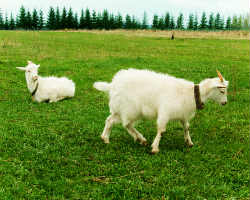
I bought a house, so that makes me a homeowner. A week later I got a goat and some sheep, so that makes me a farmer.
The goat and sheep actually belong to Martha Grace. She is the true farmer. She carted a small farm – including a dirty, hillbilly dog named Blue – over a hundred miles.
She and I have a Rent-A-Living-Lawnmower situation going. I provide acreage of grass, trees, shrubs plus some shelter and water, and she gets the peace of mind that her farm animals will be well fed, and possibly well entertained, while I get natural clearing. She will come back for them when the job is done and they will move on to a lesser fate. I couldn’t keep pigs. I like bacon too much.
The benefits of using natural lawn mowers go beyond saved time and money. According to Consumer Reports, small, two-stroke engines used in conventional lawn-care equipment are big polluters. Mowing a lawn one hour per week for an entire summer consumes only 10 gallons of gas, but releases an average of 148 pounds of carbon dioxide emissions per year. Furthermore, one hour on an average riding mower emits roughly the same amount of nitrogen dioxide, one of the key contributors to smog, as driving a very clean new car for 75,000 miles. Whoa!
It has been a few weeks since these little guys descended on me. And I have learned some things. Sheep are grazers. They do a pretty good job with the grass, and will eat some of the weeds, too. They tend not to be overly destructive of landscaping.
Goats are browsers. They'll eat some grass if they have to, but they'll be much happier working on your greenery, shrubs, and trees. A fun plus: they eat all the nasty stuff; the weeds including poison ivy, thistles, and thorny berry vines. Many years ago, in Berkeley, California, goats were being used to control brush around the fringes of a fancy neighborhood full of heritage homes. Said goats ate a rose bush at one of those homes that was 100-plus years old.
Google headquarters used goats to naturally mow its campus. A friend of mine worked there and said they were stellar but would give you a swift head butt if they felt like it, could be quite loud, and their droppings tended to be a bit more of a heavy shower than a misty dew.
In Portland, Oregon, you can rent a goat to mow your lawn. According to Eco-Goats, a renter of mowing goats, their critters have handled areas from 12-by-60 foot backyards to 20,000 acres. On the smaller scale, Eddie Miller of Heritage Lawn Mowing in Ohio was profiled in The New York Times for his sheep-powered natural mowing business. For $1 per sheep per day, he rents out his sheep for lawn-cutting services. And yes, goatfinder.com and rentarimuniant.com do actually exist.
Goats have many advantages over normal lawn mowers: They can get to places where normal mowers can't, and natural animal mowing actually slows down regrowth because animals' digestive systems sterilize the seeds. And goats let you avoid the fumes from gas-powered lawn mowers (no word on the fumes from the goats themselves).
There are some things to consider before bringing a natural mower home. Anything plantlike that you don't want eaten would have to be protected. Also, they're animals and need care like any other living creature, so you can't just buy one, drop it in the yard, and leave. Critters poop. Keep that in mind. But this means they can mow your lawn and fertilize it naturally at the same time.
Unless your back yard is huge, forget cattle. Ditto horses. They'll whip a small yard into muck. Guinea pigs will trim the grass like a putting green.
Most of all, they're hilarious. Our goat, Princess Ruby Bella Tinkerbell (I know, I know) has a distinct personality. She likes to drop her hot fecal balls on the little lambs. She’s smart and likes to escape and sleep on the hood of the car.
My five-year old likes me to snap photos of her as she plays Schoolhouse with sheep. The thought of little farm babies chomping away, wheeking happily makes me fuzzy inside.
Some of us work for a better living. Elizabeth Fournier works for a better post-deathing. As a one-woman funeral service in the rural town of Boring, Oregon, she eschews big profits to prophet old-school burial practices that are kinder to humans and the Earth. But there's something about a woman who writes a book called All Men Are Cremated Equal: My 77 Blind Dates as a way of finding The One (and finds one, in the form of a professional cremator, no less) that makes a person want to know more about her and her green take on the doings-after-death business.




